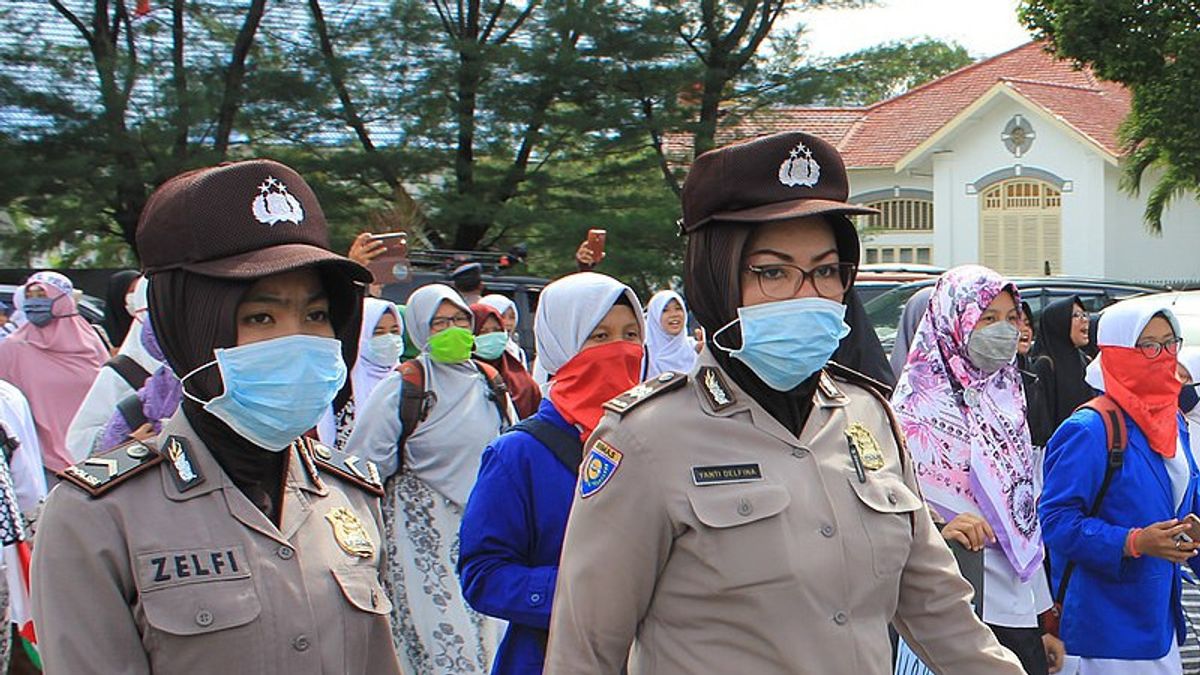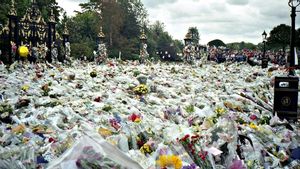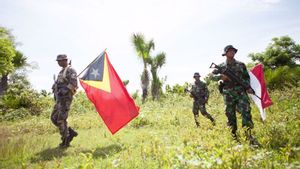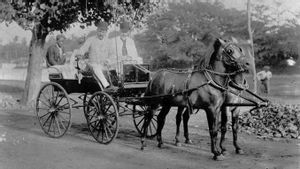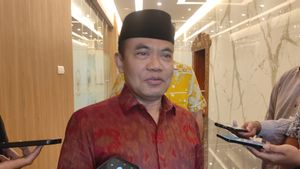JAKARTA - Every September 1, Indonesia commemorates Women Police Day or Policewomen Day. The choice of September 1 as Policewoman Day relates to the first six women to undergo police training in Indonesia.
Citing the pages of the National Police Museum, the formation of a policewoman stems from the difficulties of examining victims, suspects, or female witnesses, especially physical examinations in handling cases. At that time the police often asked their wives and female civil servants to carry out their physical examination tasks.
Seeing this situation, women's organizations and Islamic women's organizations in Bukittinggi submitted a proposal to the government for women to be included in police education. The Branch of the State Police for Sumatra, located in Bukittinggi, provides an opportunity to educate selected women to become police officers. On September 1, 1948, six female students were officially included. They are Mariana Saanin, Nelly Pauna, Rosmalina Loekman, Dahniar Sukotj, Djasmainar and Rosnalia Taher.
The six women attended police inspector education along with 44 male students at SPN Bukittinggi. The six women also became pioneers of policewomen in Indonesia. Unfortunately on December 19, 1948, when the Second Dutch Military Aggression occurred, the education of police inspectors in Bukittinggi was stopped and closed.
On July 19, 1950, the six prospective female police inspectors resumed their training but this time at SPN Sukabumi. During their education, the six female police inspectors received lessons in social sciences, education, and psychology, sociology, psychology. They also learn to differentiate themselves such as training in fencing, jiu jit su, judo, and other military education.

After various trainings, the six female police inspector candidates successfully completed their education on May 1, 1951. They began serving in the National Police Department and the Greater Jakarta Police Commissariat. The six heroines of the police have special duties regarding policing related to women, children, and social issues such as investigating, eradicating, and preventing crimes committed by or against women and children.
The first six policewomen also assist the general police in investigating and examining cases against defendants or special witnesses to physically examine women involved or defendants in a case. They are also involved in monitoring and combating prostitution, trafficking in women and children.
On November 29, 1986, the then Chief of Police, General of Police Drs. Mochammad Sanoesi ratified the policewoman emblem by issuing Decree No. Pol.: Skep/480/XI/1986. The policewoman's emblem consists of a sunflower which means female nature, seven and four flowers symbolizing the Tribrata Police's way of life, and the work guidelines of the Indonesian National Police Catur Prasetya Polri, the shield, and torch symbolizing that the policewoman is a member of the Indonesian police force, three gold stars mean Tribrata as a way of life for the Indonesian National Police. every member of the police.
In the Policewomen's symbol, there is also 1948 which symbolizes the first policewoman in the police and the writing of Esthi Bhakti Warapsari which means the dedication of selected daughters towards the achievement of noble ideals, namely the creation of the Kerta Raharja Tranquility Society for the state and nation.
Senior policewoman officer
The first time a policewoman got a high position in the National Police was in 1987, namely First Lieutenant Pol. Dwi Gusiyati, who is the first policewoman to serve as Kapolsek at Kliwon Market, Solo. Then there is Police Brigadier General Jeanne Mandagi, SH, who was the first female policewoman to receive the rank of one-star general in 1991. Then there is Police Brigadier General Rumiah Kartoredjo who became the first female policewoman to serve as Chief of Regional Police (Kapolda) in 2008. However, until now it is very rare to find female policewomen who have a high position in the Police.
In the article Why There Are No Policewomen in the Position of the National Police Chief?, we have discussed the reasons why there has never been a female policewoman who has been able to occupy the highest position, namely the Chief of Police. According to the Commissioner of the National Police Commission (Kompolnas) Poengky Indarti, the difficulty of female policewomen in pursuing a position as the leader of the National Police cannot be separated from the history of the development of female police officers themselves. According to him, it all started when Polri was integrated into ABRI in the 1950s.
"When they were merged into ABRI with the TNI, it was subject to ABRI rules. At that time, ABRI did not recruit women as soldiers", Poengky said when contacted by VOI.

The first six women to receive police training (Police Museum)
So that at that time the development of Polwan stagnated. It wasn't until around 1975 that the women's class at the police education school in Ciputat was re-opened. Then in the 1980s, there was also a new Pusdik Polwan.
"That's a non-commissioned officer if the cadets or the Police were only opened around the 2000s. So the pursuit is very far. Since that policy, Policewomen got stagnated", said Poengky.
Poengky also said that at that time both the police and the army were only seen as men. "So it is understandable that later there were no policewomen whose positions could reach three-star generals", he said.
However, Poengky said the constitution does not at all forbid members of the policewomen from becoming the National Police Chief. According to him, it is open to anyone as long as they meet the conditions stipulated by law.
"A policewoman can become the National Police Chief, as long as she fulfills the requirements in Article 11 of Law No. 2 of 2002. But then, there is Wanjakti, there is also Kompolnas. We propose to the President based on track records, achievements. But the name whether it's a boy or a girl, it's okay", said Poengky.
Poengky does not deny that to become a National Police Chief, apart from having a three-star rank, he must also have extraordinary achievements. "Maybe there has been an extraordinary promotion. It can't be that other average achievements can also be like that, and then we will nominate the rich or not". However, in the future, it is possible for a policewoman to become the National Police Chief, said Poengky. "The policewomen who can achieve three stars can become the National Police Chief in the future", concluded Poengky.
*Read other information about TODAY's HISTORY or read other interesting articles from Putri Ainur Islam.
More on TODAY'S HISTORY
SEE ALSO:
The English, Chinese, Japanese, Arabic, and French versions are automatically generated by the AI. So there may still be inaccuracies in translating, please always see Indonesian as our main language. (system supported by DigitalSiber.id)
